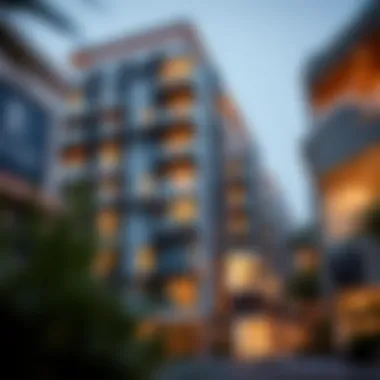Navigating the Dubai Real Estate Landscape: Insights and Strategies


Intro
Navigating the intricacies of Dubai's thriving real estate market can often feel like attempting to find your way through a labyrinth. With its impressive skylines, luxury developments, and a melting pot of cultures, understanding the dynamics of this market is crucial for investors and homebuyers alike. The rapid growth and diversification seen in Dubai’s property landscape are not mere anecdotal evidence of its appeal; they reflect an evolution influenced by economic policies, investor sentiments, and global trends.
In recent years, Dubai has transformed into a global hub for finance, commerce, and tourism. For anyone keeping a keen eye on real estate investments or considering a home purchase in this vibrant city, being well-informed is not just advantageous; it’s essential. This article seeks to illuminate critical aspects of the Dubai real estate realm, ranging from current market trends to savvy investment strategies. Readers will embark on a journey through various facets of the market, gaining insights into property types, neighborhood dynamics, and the legal frameworks governing transactions.
As we delve into Market Trends, we will explore current property prices that shape investment opportunities, as well as future predictions to be aware of. Following that, the discussion will transition into Investment Strategies, equipping readers with smart buying tips and financing options that can make or break their real estate ventures. This exploration paves the way for a clearer understanding of what it means to navigate this vibrant and often unpredictable landscape.
Buckle up! It’s time to dive in and gain the insights needed to traverse the Dubai real estate market with confidence.
Understanding the Dubai Real Estate Market
The Dubai real estate market stands out as a dynamic and multifaceted entity, particularly crucial for investors and homeowners seeking opportunities in one of the globe's most fast-growing regions. Understanding this market is not just about knowing where to buy; it’s a holistic approach that encompasses trends, types of properties, legal stipulations, and the economic factors at play. It lays the groundwork for making informed decisions, ensuring one doesn't just dive headfirst without a life jacket.
Historical Context of Real Estate in Dubai
Dubai’s real estate saga began in the latter part of the 20th century when the emirate started to transform from a modest fishing and trading port into a vibrant city booming with development. The 2002 initiative permitting foreigners to own property was a game-changer, leading to a flurry of investment. Fast-forward to today, this historical backdrop shapes the current market, painting a portrait of growth in residential and commercial sectors. Recognizing this history empowers potential investors to understand contemporary market fluctuations and buyer sentiments that are influenced by decades of transformation.
Current Market Trends
The real estate landscape in Dubai is ever-shifting, with several notable trends coming to the surface.
Property prices and forecasts
In recent years, property prices in Dubai have witnessed significant fluctuations. 197.4 billion AED was the real estate sector's contribution to the GDP, indicating its critical importance to the economy. Current trends show a gradual increase in property values, driven by demand and a recovering economy post-pandemic. The vibrant job market has translated to increased expatriate leasing demand, pushing prices upwards. Sellers are now more optimistic than ever, giving rise to a seller's market. For buyers, being aware of forecasted price hikes can inform their purchasing decisions. In this context, waiting might mean paying more later, emphasizing the need for timely action.
Investment hotspots
Investment hotspots have emerged throughout Dubai, each with unique characteristics. Areas like Dubai Marina and Downtown Dubai consistently attract high interest due to their luxurious offerings and robust amenities. Emerging neighborhoods, such as Dubai South, offer more affordable options with immense potential for growth. Such spots are popular not only for their aesthetic appeal but also for strategic positioning within the city. Investors should weigh the potential upsides against the associated risks; what may feel like a prime opportunity today could shift as the market evolves.
Impact of global events
The global landscape greatly influences Dubai’s real estate market. Events such as the Expo 2020 and fluctuations in oil prices have roots in global trends, translating into local market impacts. For instance, global economic unrest can either deter investment or create opportunities through lower entry prices. Recognizing how global events impact Dubai's market can significantly enhance decision-making. Awareness of these factors can be the difference between a wise investment and an unfortunate miscalculation.
Role of Foreign Investors
Dubai has built a reputation as a hub for foreign investment in real estate, fueled by attractive ownership laws and a welcoming regulatory environment.
Foreign ownership laws
Foreign ownership laws in Dubai are relatively liberal compared to other global cities. The decree established allowing 100% ownership in designated freehold areas underpins why many investors flock to the emirate. The benefit? Investors regain full control without a local partner. However, it’s imperative to grasp the legalities and potential impediments that may arise. Clarity on these laws can prevent costly mistakes, establishing a solid foundation for investment.
Trends in expatriate investment
Expatriate investment trends have shown remarkable growth, particularly in response to urban development and livability factors. Many expatriates choose to invest in the property sector, analyzing it as a reliable avenue for wealth generation. This creates a vibrant market where diversity and appeal draw in buyers from various backgrounds. Notably, the allure of Dubai’s lifestyle and the availability of world-class amenities bolster investor interest. However, understanding cultural preferences and differing financial strategies among various expatriate communities can optimize investment approaches.
This section sheds light on the critical variables influencing the Dubai real estate market, providing investors and homebuyers with the necessary tools for strategic navigation in their property pursuits. Through analyzing historical trends, understanding current market dynamics, and grasping foreign investor roles, readers come away with actionable insights that equip them to make informed investments.
Types of Properties Available
In the lively arena of Dubai's real estate market, understanding the various types of properties available is crucial for anyone looking to invest or buy a home. Each property type comes with its own unique set of advantages and considerations, making it essential for buyers to align their choices with personal and financial goals. The diversity of properties offers something for everyone, from high-end luxury seekers to those looking for modest living spaces.
Luxury Villas and Homes
Luxury villas in Dubai symbolize not just lavish living but also a specific lifestyle. These properties often boast top-notch amenities and are situated in prime locations like Palm Jumeirah and Emirates Hills. Buyers can expect features such as private pools, expansive gardens, and breathtaking views of the city or sea.
Investing in a luxury villa can yield significant returns, especially in vibrant neighborhoods where demand remains consistently high. However, potential buyers should pay careful attention to factors like property maintenance costs and homeowners association fees, which can vary greatly from one community to another.
Apartments and Condominiums
Apartments and condominiums offer a more varied and affordable entry point into the Dubai property market. From budget-friendly studios in Dubai Marina to more spacious three-bedroom units with waterfront views, the choices are abundant. These properties are especially appealing to expatriates and young professionals, as they often come with shared amenities such as gyms, pools, and community lounges.
The allure of apartments extends beyond their aesthetic appeal; the potential for rental yields can be quite attractive in popular areas. With constantly fluctuating rental demands, it’s prudent to keep an eye on market trends to make informed decisions about either buying for personal use or as an investment.
Commercial Real Estate


For those with an entrepreneurial spirit, commercial real estate in Dubai presents myriad opportunities. Whether it’s office spaces in Dubai Silicon Oasis or retail units in bustling malls, this sector is thriving. Given the city’s position as a global business hub, investing in commercial properties can be financially rewarding.
However, investing in commercial real estate isn’t without challenges. Factors such as leasing terms, tenant management, and market saturation must be taken into account. Hence, potential investors should conduct thorough due diligence or enlist professional help to navigate this complex domain effectively.
Off-Plan Developments
Off-plan developments, or properties still under construction, are increasingly popular amongst investors who are keen on capital appreciation. They represent a way to buy into emerging neighborhoods at potentially lower prices, which is appealing when considering the expected increase in property values upon completion.
Nonetheless, buying off-plan comes with its own risks. These can include project delays and changes to floor plans or designs. It’s essential for buyers to review the developer’s reputation, as well as the legal safeguards in place to protect their investments.
It can be wise to consult sources such as Dubai Land Department to ensure that your purchase complies with local laws and regulations.
Ultimately, understanding the types of properties available is foundational for making sound real estate decisions in Dubai. As buyers navigate through various options, keeping abreast of market trends and legal considerations can support their investment journeys.
Investment Strategies in Dubai
Investing in Dubai's real estate requires a well-thought-out approach. Understanding various strategies is essential for making informed decisions that can lead to significant financial gains. Investors, whether seasoned or new to the market, need to balance risk and reward in a landscape that thrives on volatility and change. The strategies one employs can vary significantly based upon personal goals, market conditions, and even regional trends. Here's a deep dive into three crucial investment strategies to consider.
Long-Term vs Short-Term Investment
When delving into Dubai's real estate market, one has to decide between long-term and short-term investment strategies. Long-term investment typically involves holding a property for several years, benefitting from appreciation in value over time. This strategy provides a more stable income, often with rental yields that increase as the area develops. On the other hand, short-term investment, or flipping properties, requires a more hands-on approach and a keen eye for market timing. This strategy can generate quick returns, but it comes with higher risks, especially in a market as dynamic as Dubai's.
Each approach has its pros and cons:
- Long-Term Investment
- Short-Term Investment
- Pros:
- Cons:
- Steady cash flow from rental income.
- Potential for significant price appreciation.
- Less frequent transactions mean lower costs connected to buying and selling.
- Capital is tied up for extended periods.
- Market fluctuations can impact overall returns.
- Pros:
- Cons:
- Quick profits through renovation and resale.
- Opportunities to capitalize on shifting market dynamics.
- Higher transaction costs and taxes.
- Requires knowledge of market timing and property renovations.
Ultimately, the decision hinges upon your investment horizon and risk appetite.
Understanding Rental Yields
Rental yields serve as a vital indicator for both property owners and investors. It expresses the annual income generated from a property as a percentage of its cost. In Dubai’s competitive market, knowing how to calculate and interpret rental yields can give investors an edge. Higher yields often indicate a lucrative investment, while lower yields may suggest either an overvalued property or less demand in a particular area.
To assess rental yield:
- Calculate the Gross Rental Income: Determine how much you can charge for rent each year.
- Assess the Purchase Price or Market Value of the Property: Understand the local market trends to ensure accurate valuation.
- Use the Formula:
- Analyze the Yield: Evaluate this figure through comparison with other investment options and local averages.
With average rental yields in Dubai ranging from 5% to more than 7% depending on area and property type, it’s clear that rental properties can represent a solid avenue for income if approached correctly.
Flipping Properties vs Buy and Hold
Making a choice between flipping properties and adopting a buy-and-hold strategy stands as a significant decision for any investor. Flipping properties involves purchasing a distressed or undervalued property, renovating it, and selling it quickly for a profit. This strategy thrives on short-term market fluctuations and requires a sound understanding of renovation costs, market conditions, and buyer preferences.
On the contrary, the buy-and-hold strategy is focused on the long haul, allowing the investor to benefit from rental income and price appreciation. This approach often demands less constant monitoring.
Things to keep in mind:
- Flipping Properties:
- Buy and Hold:
- Requires capital for renovations.
- Fast-paced and demand expertise in market timing.
- Potential for higher rewards, but risks include unforeseen costs.
- Steady cash flow stream through rent.
- Less risk associated with market volatility over time.
- Passive income but requires patience and a long-term outlook.
Financing Your Property Purchase


Navigating the financial landscape is a pivotal part of buying property in Dubai. With a robust market that attracts both local and foreign investors, understanding how to finance your purchase is crucial. This section delves into different mortgage products, alternate financing methods, and eligibility requirements—all aimed at empowering potential buyers with the right knowledge.
Understanding Mortgages in Dubai
Types of Mortgage Products
When it comes to obtaining finance in Dubai, various mortgage products come into play. The most common types include fixed-rate mortgages, variable-rate mortgages, and interest-only loans. Each type has its own features and serves different needs in the market.
- Fixed-Rate Mortgages offer stability, as the interest rate remains constant throughout the loan period. This can be beneficial for buyers who wish to budget their finances without the surprise of fluctuating payments.
- Variable-Rate Mortgages, alternatively, can present an attractive initial rate which may decrease further, but they come with an element of risk because the rates can rise unpredictably.
- Interest-Only Loans allow for lower initial payments, as you only pay interest for a set period. This type may appeal to investors looking to maximize their cash flow, but it comes with its own set of challenges when the principal needs to be repaid.
Understanding these mortgage types helps buyers align their financing strategy with their long-term plans, whether they are investing for rental income or purchasing a home.
Eligibility Requirements
Securing a mortgage requires meeting certain eligibility criteria, which can vary between lenders. Typically, requirements include proof of income, credit history, and the amount of down payment. Many banks in Dubai prefer a minimum of 20% down payment for expatriates, while locals often face a lower threshold.
- Proof of Income is required to assure lenders of your ability to repay the loan. This often includes salary slips, bank statements, and employment letters.
- Credit History in the UAE is also scrutinized. A good credit score can enable you better terms, while a poor score limits your options.
- The amount of down payment is a significant factor. A high down payment may translate into lower monthly payments and less interest paid overall.
Navigating the eligibility maze can be complex, but having a strong financial background makes it much easier. Before jumping in, it's wise for buyers to prepare in advance, gathering necessary documentation and understanding their financial standing.
Alternative Financing Options
Private Loans
For some buyers, traditional mortgages may not fit their circumstances. Private loans can fill this gap by offering flexible terms and faster processing. These loans are often provided by private lenders or individuals, and they might not require the stringent checks that banks do.
- The key characteristic of these loans is their flexibility. Borrowers can negotiate terms, such as repayment schedules and interest rates, allowing for a more tailored solution. This can be particularly crucial for expatriates who may struggle to meet bank requirements due to lack of local credit history.
- However, private loans typically come with higher interest rates since they are often considered riskier for lenders. This means while access may be easier, the cost of borrowing could be significantly higher.
Developer Financing
Another alternative worth considering is developer financing. Many real estate developers in Dubai offer payment plans that allow buyers to pay installments during the construction of the property.
- The major advantage of developer financing is that buyers can often secure a property without the immediate burden of a mortgage. Payment plans can be structured conveniently, making it easier to budget while the property is being built.
- However, this route may come with potential pitfalls, like higher total payments once the property is completed compared to traditional mortgages. It’s essential for buyers to carefully evaluate these plans and understand the terms thoroughly before committing.
Exploring financing options can make or break a property investment. Do your homework and choose wisely!
Understanding the financing options available to you, from traditional mortgages to newer alternatives, is essential for anyone looking to purchase real estate in Dubai. The right choice can provide not just access to property but also a successful investment for the future.
Legal Considerations
Navigating the intricacies of the Dubai real estate market requires a firm understanding of legal considerations. This aspect is paramount for investors and homeowners alike, as it sets the framework for property transactions, ownership rights, and other critical facets of real estate dealings. Knowing the legal landscape not only mitigates risks but also enhances one's confidence in making significant financial commitments.
Understanding Property Laws
Ownership Regulations
Ownership regulations in Dubai present a unique blend of opportunities and stipulations that investors should grasp thoroughly. The key characteristic of these regulations is the distinction between freehold and leasehold properties. In select areas like Dubai Marina or Downtown Dubai, foreign investors can purchase properties outright, a feature that boosts the attractiveness of the market, particularly for expatriates seeking to settle in the city. This arrangement is particularly beneficial as it allows outright ownership, which translates to a sense of permanence and the potential for capital growth.
However, it's not without its limitations. For instance, in certain zones, only UAE nationals can own land, complicating matters for foreign investors. This nuance is a unique feature of the local market, presenting both advantages—like security for local investors—and disadvantages—such as limited options for expats. Hence, understanding these ownership nuances plays a pivotal role in guiding decisions.
Transfer Fees
Transfer fees are another crucial aspect that prospective buyers should be aware of. Typically, these fees amount to around 4% of the property value and are payable when transferring ownership. The primary characteristic of these fees is their necessity for the completion of a sale. This requirement can create additional costs that need to be factored into the overall budget when purchasing property.
What makes transfer fees a particular point of interest is their function as a revenue stream for the Dubai government. While they may seem like just another cost, they contribute to infrastructural development and urban planning, which ultimately increases property values in the long run. The challenge, however, lies in ensuring that investors are financially prepared for these hidden costs, which can sometimes surprise even the most diligent planners.
The Role of Real Estate Brokers
Real estate brokers can significantly simplify the complexities of property transactions. They serve as navigators, helping clients through the often murky waters of legal considerations. Brokers ensure that all paperwork is in order, provide insights into the prevailing laws, and offer invaluable advice tailored to specific scenarios. Employing the services of a qualified broker can substantially reduce the likelihood of encountering legal pitfalls.
Valuation of Properties
Understanding the valuation of properties in Dubai's dynamic real estate market is paramount for any investor or homeowner. This aspect not only establishes how much a property is worth but also guides crucial decision-making in buying, selling, or renting. Proper valuation aligns expectations with reality, helping you navigate this intricate landscape with greater certainty. When you have a clear grasp of property values, you can capitalize on opportunities, avoid pitfalls, and ultimately secure better returns on investment.
Factors Influencing Property Value


Location analysis
Location is the cornerstone of real estate. It's the reason why some properties are seen as golden opportunities while others collect dust on the market. An effective location analysis examines factors such as proximity to key facilities, safety, and overall desirability of a neighborhood.
- Key characteristics: Areas close to schools, shopping centers, and public transport tend to attract more buyers and renters. Properties in up-and-coming areas can offer exceptional long-term value, especially if growth trends point toward infrastructure improvements.
- Unique features: In Dubai, waterfront locations or properties with views of landmarks like the Burj Khalifa can command premium prices. However, while a prime location can bolster property value, it can also lead to fluctuations during economic downturns, making them more volatile.
Market comparables
Market comparables, or
Navigating Neighborhoods
Understanding the various neighborhoods in Dubai is critical to making informed real estate investments and lifestyle choices. The emirate’s landscape is a melting pot of cultures, each neighborhood offering a unique blend of experiences. For expatriates, the choice of where to live can significantly impact one's daily life, social connections, and even professional opportunities. In this section, we will explore popular areas favored by expats and highlight emerging neighborhoods that are gaining traction.
Popular Areas for Expats
Community features
When thinking of community features in Dubai, you need to consider the sense of belonging that these neighborhoods foster. Areas like Jumeirah and Dubai Marina are not just about stunning views; they boast family-friendly parks, communities with active social events, and supportive environments for newcomers. One of the standout characteristics here is that these neighborhoods often host cultural festivities. This multicultural network helps expats feel at home, making it an attractive option for those looking to settle down.
The community feel is particularly engaging. Take Jumeirah Beach Residence, for instance. It’s not just the beachfront properties that draw people in, but also the array of cafes and recreational spots that make it an inviting hub. The blend of leisure and living is a distinct advantage in helping expats establish connections with fellow residents.
However, it is essential to remain careful. Some neighborhoods might be desirable but can become crowded or overly commercialized, detracting from that sought-after community vibe.
Accessibility and Amenities
In today’s fast-paced world, accessibility is everything. The neighborhoods like Downtown Dubai excel in this domain. Featuring superb connectivity through metro stations and major roadways, it allows residents to commute effortlessly. This accessibility grants endless options – from shopping at The Dubai Mall to immersing into the nightlife of La Mer.
Moreover, amenities in these neighborhoods can determine quality of life. Think of healthcare services, schools, and recreational facilities. Areas that provide ready access to high-caliber schools, for instance, are often preferred by families. An impressive characteristic of these regions is the abundant green spaces, parks, and fitness centers conducive to a holistic lifestyle.
Yet, this convenience can come at a price. Neighborhoods with superb amenities tend to have higher rental costs, which is a consideration for budget-conscious buyers or renters. Striking the right balance between costs and convenience is crucial.
Emerging Neighborhoods to Watch
While established areas offer plenty of charm, emerging neighborhoods like Al Furjan and Dubai South are worth watching for savvy investors. These areas are evolving rapidly, with new developments springing up regularly. With more affordable pricing compared to their more famous counterparts, these neighborhoods are attracting not just new residents but also developers aiming to capitalize on future growth. Sure, they may not yet have the extensive amenities of places like Dubai Marina, but the potential is significant.
Furthermore, as infrastructure improves—including roads, public transport, and retail space—these areas are poised to become the next hotspots in Dubai’s real estate landscape. This makes them attractive for long-term investments, particularly for individuals looking to buy property today and benefit from appreciation over time.
In summary, navigating neighborhoods in this vibrant city goes well beyond choosing a place to live. Each community tells a different story concerning lifestyle, culture, and opportunities.
"Choosing the right neighborhood is more than a decision; it’s about setting the stage for your Dubai experience."
Understanding these diverse aspects not only shapes your decision-making process but also enriches the experience of living in one of the world's most dynamic metropolises.
Sustainability and Future Trends
In the realm of real estate, sustainability is rapidly becoming a cornerstone of development and investment strategy. As Dubai continues to grow, the demand for eco-friendly developments cannot be overstated. This shift not only reflects a global trend but aligns with the city's vision to become a pioneering model of sustainability. Investors and homeowners alike are drawn to properties that prioritize environmental considerations, making this an essential topic in our discussion of the Dubai real estate landscape.
Sustainability not only appeals to the environmentally conscious but also brings numerous benefits. Properties built with eco-friendly materials often experience enhanced marketability. Many buyers today are not just looking for a roof over their heads; they want homes that reflect their values. Energy efficiency, sustainable resource management, and reduced carbon footprints are paramount. Developers embracing these principles may find themselves at an advantage, often leading to increased demand and potentially higher property values.
"In the future, buyers will likely demand sustainability as a non-negotiable feature in property purchase considerations."
Eco-Friendly Developments
The push for eco-friendly developments in Dubai is gaining momentum, significantly shaping the urban environment. These developments are not merely absent of harm; they contribute positively to the ecological landscape, promoting biodiversity and facilitating healthier lifestyles. Projects like Sustainable City represent a paradigm shift, integrating renewable energy sources, waste recycling systems, and lush green spaces. This project stands as a testimony to the kind of innovative thinking that could set the tone for future ventures.
Furthermore, the incorporation of smart technologies plays a critical role in these eco-friendly developments. High-tech building management systems can enhance energy efficiency while monitoring water usage and air quality. Such advancements not only satisfy the modern buyer's expectations but also make properties more appealing to investors looking for valuable long-term gains. The Dubai Electricity and Water Authority (DEWA) is actively promoting initiatives to encourage these types of projects, which create a win-win scenario for both the environment and the economy.
The Future of Urban Living
Looking ahead, the future of urban living in Dubai seems poised for transformation. As the population grows and urban density increases, urban planners are focusing on creating livable spaces that prioritize sustainability and community engagement. This vision encompasses not just housing but also integrated transport solutions, green spaces, and comprehensive amenities that foster a sense of belonging.
The concept of smart cities is becoming increasingly relevant. These cities blend technology with environmental consciousness, ensuring that urban living is not just sustainable but also adaptable. Innovations such as electric public transport and shared mobility services are slowly weaving into the urban fabric, aiming to reduce traffic congestion and pollution.
Moreover, community-driven projects are on the rise. Initiatives that focus on inclusivity and social interaction are becoming vital components in urban planning. Green corridors, pedestrian paths, and community gardens foster interaction within neighborhoods, making urban life more enjoyable and socially enriching.
Investors looking to navigate these future trends should consider properties located in areas that are part of these broader plans. Understanding such developments will not only make informed choices easier but could also lead to significant returns in a market that values sustainability as a key pillar of growth.
For more detailed discussions on sustainability issues in urban planning, insightful readings on sustainable cities can be found at Britannica.
The journey to a sustainable Dubai is not a sprint but a marathon. As we look to the future, the integration of environmental, social, and economic factors will shape the landscape of real estate investment, creating a dynamic environment for both current and aspiring homeowners.



